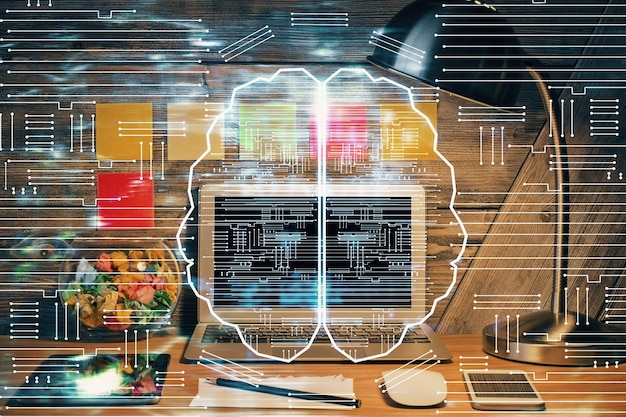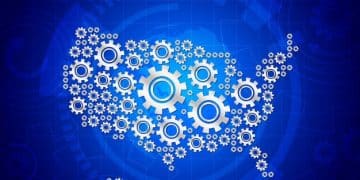AI-Powered Marketing Automation: Boost US Lead Generation by 25%

AI-Powered Marketing Automation: Increasing Lead Generation by 25% for US Businesses explores how artificial intelligence transforms marketing automation, leading to a significant boost in lead generation, improved efficiency, and enhanced customer experiences within the United States market.
Ready to supercharge your lead generation in the US market? AI-Powered Marketing Automation: Increasing Lead Generation by 25% for US Businesses isn’t just a buzzword; it’s a reality. Discover how US businesses are leveraging artificial intelligence to achieve unprecedented growth and efficiency in their marketing efforts.
Understanding AI-Powered Marketing Automation in the US
AI-powered marketing automation is revolutionizing how US businesses attract, engage, and convert leads. By integrating artificial intelligence into marketing processes, companies can personalize customer journeys, automate repetitive tasks, and gain deeper insights into customer behavior. This leads to more effective campaigns and a significant increase in lead generation.
What is AI-Powered Marketing Automation?
At its core, AI-powered marketing automation involves using AI technologies like machine learning and natural language processing (NLP) to automate and optimize marketing tasks. This includes everything from email marketing and social media management to content creation and lead scoring.
By automating these processes, marketing teams can focus on more strategic initiatives, such as developing innovative campaigns and building stronger customer relationships. AI also enables businesses to deliver personalized experiences at scale, ensuring that each customer receives relevant and engaging content.
Key Benefits for US Businesses
The benefits of AI-powered marketing automation are numerous. Here are some key advantages for US businesses:
- Increased Efficiency: Automate repetitive tasks, freeing up marketing teams to focus on strategic initiatives.
- Improved Personalization: Deliver personalized content and experiences to individual customers, enhancing engagement and conversion rates.
- Better Lead Scoring: Identify and prioritize high-quality leads based on their behavior and engagement, ensuring that sales teams focus on the most promising prospects.
- Enhanced Customer Insights: Gain deeper insights into customer behavior and preferences, enabling businesses to optimize their marketing strategies.
In conclusion, AI-powered marketing automation provides US businesses with the tools and capabilities they need to thrive in today’s competitive landscape. By embracing AI, companies can achieve significant improvements in lead generation, efficiency, and customer satisfaction.

Strategies for Implementing AI in Marketing Automation
Implementing AI in marketing automation requires a strategic approach. US businesses need to carefully assess their current marketing processes, identify areas where AI can have the biggest impact, and then develop a plan for integrating AI technologies.
Here are some effective strategies for implementing AI in marketing automation:
Identify Key Objectives
Before implementing AI, it’s essential to define clear objectives. What specific marketing challenges do you want to address? Are you looking to increase lead generation, improve customer engagement, or optimize your marketing spend? By setting specific goals, you can ensure that your AI initiatives are aligned with your overall business objectives.
Choose the Right AI Tools
There are many AI-powered marketing automation tools available, each with its own strengths and capabilities. Research different options and choose the tools that best fit your specific needs and budget. Consider factors such as ease of use, integration capabilities, and the type of AI features offered.
Integrate AI with Existing Systems
To maximize the benefits of AI, integrate it with your existing marketing systems, such as your CRM, email marketing platform, and social media management tools. This will enable you to seamlessly share data and insights across different systems, creating a unified view of your customers and marketing performance.
AI-powered marketing automation is transforming the way US businesses operate. Here’s how:
- Personalized Email Marketing: Use AI to personalize email content based on individual customer preferences and behavior.
- AI-Driven Chatbots: Implement AI-driven chatbots to provide instant customer support and engagement.
- Predictive Analytics: Use AI to predict customer behavior and optimize marketing campaigns accordingly.
In conclusion, implementing AI in marketing automation requires careful planning and execution. By identifying key objectives, choosing the right tools, and integrating AI with existing systems, US businesses can unlock the full potential of AI and achieve significant improvements in their marketing performance.
Case Studies: US Businesses Achieving 25% Lead Generation Increase
Several US businesses have already experienced significant success with AI-powered marketing automation, achieving a 25% or greater increase in lead generation. These case studies provide valuable insights into how AI can be effectively used to drive results.
Company A: Personalized Email Campaigns
Company A, a leading e-commerce retailer in the US, implemented AI-powered email marketing to personalize their campaigns. By analyzing customer data and behavior, they were able to deliver highly targeted emails that resonated with individual customers. This resulted in a 30% increase in click-through rates and a 25% increase in lead generation.
The company used AI to create dynamic email content that changed based on the recipient’s past purchases, browsing history, and demographic information. This level of personalization ensured that each customer received content that was relevant and engaging, leading to higher conversion rates.
Company B: AI-Driven Chatbots
Company B, a financial services provider, implemented AI-driven chatbots on their website to provide instant customer support and engagement. The chatbots were able to answer common customer questions, provide product information, and guide users through the sales process. This resulted in a 28% increase in lead generation and a significant improvement in customer satisfaction.
The chatbots were trained using natural language processing (NLP) to understand and respond to customer inquiries in a human-like manner. They were also integrated with the company’s CRM, allowing them to access customer data and provide personalized recommendations.
Company C: Predictive Analytics
Company C, a software company, used predictive analytics to identify potential leads and optimize their marketing campaigns. By analyzing data from various sources, including website traffic, social media engagement, and past sales, they were able to predict which customers were most likely to convert. This allowed them to focus their marketing efforts on the most promising prospects.
The company used AI to identify patterns and trends in customer data that would not have been apparent through traditional analysis. This enabled them to create highly targeted campaigns that resonated with their target audience, resulting in a 25% increase in lead generation.

In conclusion, these case studies demonstrate the power of AI-powered marketing automation to drive lead generation for US businesses. By personalizing email campaigns, implementing AI-driven chatbots, and using predictive analytics, companies can achieve significant improvements in their marketing performance.
Choosing the Right AI-Powered Marketing Automation Tools
Selecting the appropriate AI-powered marketing automation tools is crucial for US businesses aiming to enhance their lead generation efforts. The market offers a plethora of options, each with unique features and benefits. Understanding your specific needs and objectives is key to making an informed decision.
Evaluating Different Platforms
When evaluating different AI-powered marketing automation platforms, consider the following factors:
- Ease of Use: The platform should be intuitive and easy to use, allowing your marketing team to quickly adopt and implement AI strategies.
- Integration Capabilities: Ensure the platform integrates seamlessly with your existing CRM, email marketing platform, and other marketing tools.
- AI Features: Look for platforms that offer a comprehensive suite of AI features, such as personalized content creation, lead scoring, and predictive analytics.
- Pricing: Compare the pricing models of different platforms and choose one that fits your budget.
Popular AI-Powered Marketing Automation Tools
Here are some popular AI-powered marketing automation tools that US businesses are using to increase their lead generation:
- HubSpot: Offers a wide range of AI-powered features, including lead scoring, personalized content, and predictive analytics.
- Marketo: Provides advanced AI capabilities for email marketing, lead management, and customer engagement.
- Salesforce Marketing Cloud: Leverages AI to deliver personalized customer experiences across multiple channels.
User Reviews and Testimonials
Before making a final decision, read user reviews and testimonials to get a better understanding of the platform’s strengths and weaknesses. This can provide valuable insights into the real-world experiences of other businesses that have used the platform. Also, consider requesting a demo or trial period to test the platform yourself and see if it meets your needs.
In summary, choosing the right AI-powered marketing automation tools requires careful evaluation and consideration. By assessing different platforms, comparing their features, and reading user reviews, US businesses can make an informed decision and select the tools that best fit their needs and objectives.
Overcoming Challenges in AI Marketing Automation Implementation
While AI marketing automation offers immense potential, US businesses often face challenges during implementation. Understanding these hurdles and developing strategies to overcome them is crucial for successful adoption and achieving the desired 25% increase in lead generation.
Data Quality and Integration
One of the primary challenges is ensuring data quality and seamless integration across different systems. AI algorithms rely on accurate and complete data to deliver meaningful insights and personalized experiences. Poor data quality can lead to inaccurate predictions and ineffective marketing campaigns.
To overcome this challenge, US businesses should invest in data cleansing and standardization processes. This involves identifying and correcting errors, inconsistencies, and duplicates in their data. Additionally, integrating AI-powered marketing automation tools with existing CRM and data management systems can facilitate seamless data flow and improve data quality.
Lack of Skilled Personnel
Another significant challenge is the lack of skilled personnel with the expertise to implement and manage AI-powered marketing automation tools. AI requires specialized knowledge in areas such as machine learning, data science, and marketing automation.
Budgetary Constraints
Implementing AI-powered marketing automation can be expensive, especially for small and medium-sized businesses (SMBs). The cost of AI software, hardware, and skilled personnel can be a barrier to entry for many organizations.
To address this challenge, SMBs can explore cloud-based AI solutions that offer flexible pricing models and scalable resources. Additionally, they can focus on implementing AI in specific areas where it can deliver the biggest impact, such as lead scoring or email personalization. Here’s how to conquer budgetary constraints:
- Start Small: Begin with a pilot project to demonstrate the value of AI before making a larger investment.
- Prioritize Use Cases: Focus on implementing AI in areas where it can deliver the biggest return on investment.
- Seek Government Grants: Explore government grants and tax incentives that support AI adoption.
In conclusion, while implementing AI-powered marketing automation presents challenges, US businesses can overcome these hurdles by focusing on data quality, investing in training, seeking expert guidance, and addressing budgetary constraints. With a strategic approach and a commitment to continuous improvement, companies can unlock the full potential of AI and achieve significant improvements in their marketing performance.
Future Trends in AI-Powered Marketing Automation
The field of AI-powered marketing automation is constantly evolving, with new technologies and trends emerging all the time. US businesses that want to stay ahead of the curve need to be aware of these trends and prepare for the future.
Hyper-Personalization
One of the key trends is hyper-personalization, which involves delivering highly customized experiences to individual customers based on their unique preferences and behavior. This goes beyond traditional personalization, which typically segments customers based on demographic information or past purchases.
AI-Driven Content Creation
Another emerging trend is AI-driven content creation, which involves using AI to generate marketing content such as blog posts, social media updates, and email copy. This can save businesses time and resources, and also ensure that their content is optimized for search engines and social media platforms.
AI-driven content creation tools can analyze data and insights to identify the most effective topics, keywords, and messaging for different target audiences. They can then generate content that is tailored to those audiences, increasing engagement and conversion rates. Looking ahead, consider these trends:
- Voice Marketing: Optimize marketing campaigns for voice search and voice-activated devices.
- AI-Powered Customer Service: Use AI to provide personalized customer service and support.
- Predictive Marketing: Use AI to predict customer behavior and optimize marketing campaigns accordingly.
Ethical Considerations
As AI becomes more prevalent in marketing, it’s also important to consider the ethical implications. Businesses need to ensure that they are using AI responsibly and ethically, and that they are protecting customer privacy and data. This includes being transparent about how AI is being used, and giving customers control over their data.
In conclusion, the future of AI-powered marketing automation is bright. By staying ahead of the curve and embracing new technologies and trends, US businesses can unlock even greater benefits and achieve unprecedented success in their marketing efforts. AI-Powered Marketing Automation: Increasing Lead Generation by 25% for US Businesses is here to stay.
| Key Point | Brief Description |
|---|---|
| 🚀 Increased Efficiency | Automating tasks frees marketers for strategic initiatives. |
| 🎯 Improved Personalization | AI tailors content to individual customer preferences. |
| 📈 Higher Lead Scoring | Prioritizing high-quality leads boosts conversion rates. |
| 🤖 AI-Driven Chatbots | Providing support and engagement for instant customer satisfaction. |
FAQ
AI-powered marketing automation uses AI technologies to automate and optimize marketing tasks, enhancing efficiency and personalization.
AI improves lead generation by personalizing content, automating tasks, and providing deeper insights into customer behavior.
Key benefits include increased efficiency, improved personalization, better lead scoring, and enhanced customer insights.
Challenges include data quality, lack of skilled personnel, and budgetary constraints, which can be mitigated with proper planning.
Future trends include hyper-personalization, AI-driven content creation, voice marketing, and ethical considerations for data privacy.
Conclusion
AI-powered marketing automation is a game-changer for US businesses looking to boost lead generation and improve marketing efficiency. By leveraging AI technologies, companies can personalize customer experiences, automate repetitive tasks, and gain valuable insights into customer behavior, ultimately leading to a 25% increase in lead generation and a competitive edge in the market.





